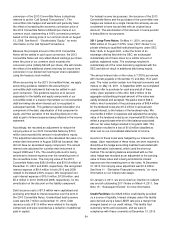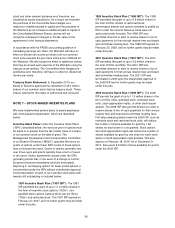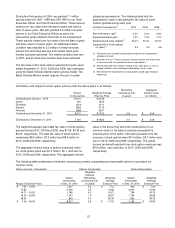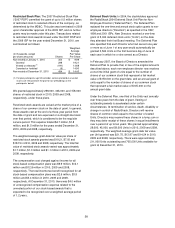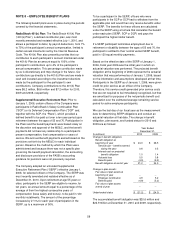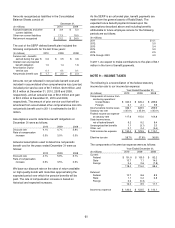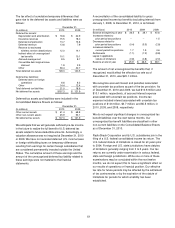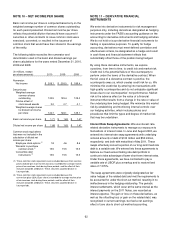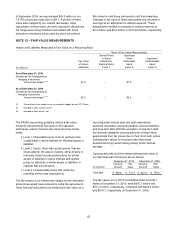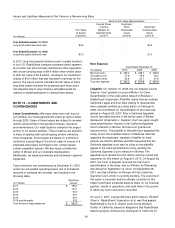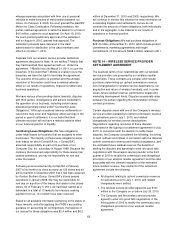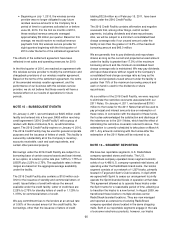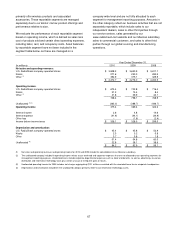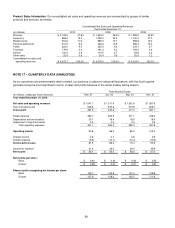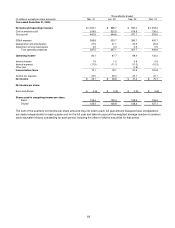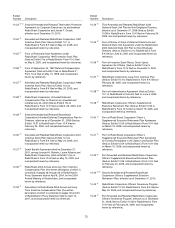Radio Shack 2010 Annual Report Download - page 74
Download and view the complete annual report
Please find page 74 of the 2010 Radio Shack annual report below. You can navigate through the pages in the report by either clicking on the pages listed below, or by using the keyword search tool below to find specific information within the annual report.
64
Assets and Liabilities Measured at Fair Value on a Nonrecurring Basis
Basis of Fair Value Measurements
Fair Value
of Assets
(Liabilities)
Quoted Prices
in Active
Markets for
Identical Items
(Level 1)
Significant
Other
Observable
Inputs
(Level 2)
Significant
Unobservable
Inputs
(Level 3)
(In millions)
Year Ended December 31, 2010
Long-lived assets held and used $0.9 -- -- $0.9
Year Ended December 31, 20
09
Long-lived assets held and used $1.0 -- -- $1.0
In 2010, long-lived assets held and used in certain locations
of our U.S. RadioShack company-operated stores segment
and certain test store formats classified as other operations
with a total carrying value of $4.9 million were written down
to their fair value of $0.9 million, resulting in an impairment
charge of $4.0 million that was included in earnings for the
period. The inputs used to calculate the fair value of these
long-lived assets included the projected cash flows and a
risk-adjusted rate of return that we estimated would be
used by a market participant in valuing these assets.
NOTE 13 – COMMITMENTS AND
CONTINGENCIES
Lease Commitments: We lease rather than own most of
our facilities. Our lease agreements expire at various dates
through 2025. Some of these leases are subject to renewal
options and provide for the payment of taxes, insurance
and maintenance. Our retail locations comprise the largest
portion of our leased facilities. These locations are primarily
in major shopping malls and shopping centers owned by
other companies. Some leases are based on a minimum
rental plus a percentage of the store's sales in excess of a
stipulated base figure (contingent rent). Certain leases
contain escalation clauses. We also lease a distribution
center in Mexico and our corporate headquarters.
Additionally, we lease automobiles and information systems
equipment.
Future minimum rent commitments at December 31, 2010,
under non-cancelable operating leases (net of immaterial
amounts of sublease rent income), are included in the
following table.
(In millions)
Operating
Leases
2011 $ 196.7
2012 140.1
2013 93.7
2014 60.1
2015 39.1
2016 and thereafter 33.2
Total minimum lease payments $ 562.9
Rent Expense:
Year Ended December 31,
(In millions) 2010 2009 2008
Minimum rents $ 229.0
$ 228.7
$ 228.8
Occupancy cost 37.6
39.4
38.2
Contingent rents 23.6
23.7
27.8
Total rent expense $ 290.2
$ 291.8
$ 294.8
Litigation: On October 10, 2008, the Los Angeles County
Superior Court granted our second Motion for Class
Decertification in the class action lawsuit of Brookler v.
RadioShack Corporation. Plaintiffs’ claims that we violated
California's wage and hour laws relating to meal periods
were originally certified as a class action on February 8,
2006. Our first Motion for Decertification of the class was
denied on August 29, 2007. After a California Appellate
Court's favorable decision in the similar case of Brinker
Restaurant Corporation v. Superior Court, we again sought
class decertification. Based on the California Appellate
Court’s decision in Brinker, the trial court granted our
second motion. The plaintiffs in Brookler have appealed this
ruling. Due to the unsettled nature of California state law
regarding the employers’ standard of liability for meal
periods, we and the Brookler plaintiffs requested that the
California appellate court stay its ruling on the plaintiffs’
appeal of the class decertification ruling, pending the
California Supreme Court’s decision in Brinker. The
appellate court denied this joint motion and then heard oral
arguments for this matter on August 5, 2010. On August 26,
2010, the Court of Appeals reversed the trial court’s
decertification of the class, and our Petition for Rehearing
was denied on September 14, 2010. On September 28,
2010, we filed a Petition for Review with the California
Supreme Court, which is currently pending. The outcome of
this action is uncertain and the ultimate resolution of this
matter could have a material adverse effect on our financial
position, results of operations, and cash flows in the period
in which any such resolution is recorded.
On June 7, 2007, a purported class action lawsuit, Richard
Stuart v. RadioShack Corporation, et al, was filed against
RadioShack in the U.S. District Court for the Northern
District of California, based on allegations that RadioShack
failed to properly reimburse its employees in California for


